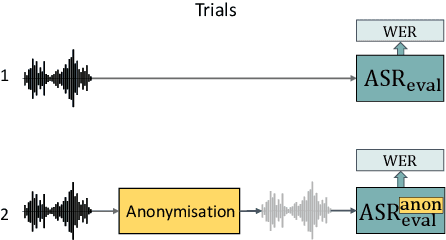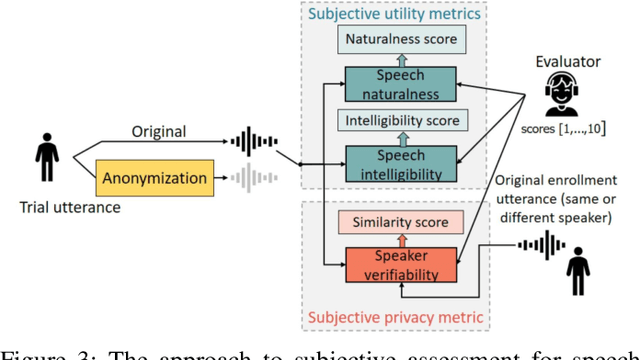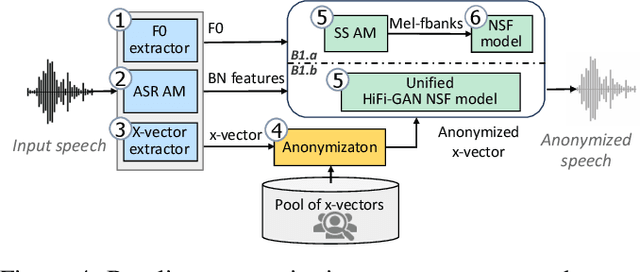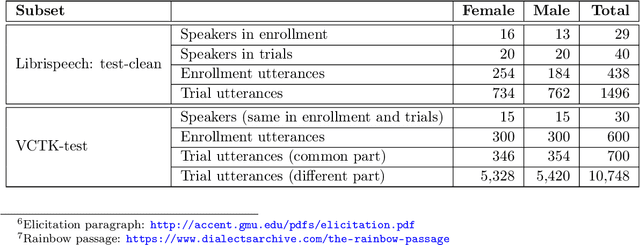Hubert Nourtel
The VoicePrivacy 2022 Challenge: Progress and Perspectives in Voice Anonymisation
Jul 16, 2024



Abstract:The VoicePrivacy Challenge promotes the development of voice anonymisation solutions for speech technology. In this paper we present a systematic overview and analysis of the second edition held in 2022. We describe the voice anonymisation task and datasets used for system development and evaluation, present the different attack models used for evaluation, and the associated objective and subjective metrics. We describe three anonymisation baselines, provide a summary description of the anonymisation systems developed by challenge participants, and report objective and subjective evaluation results for all. In addition, we describe post-evaluation analyses and a summary of related work reported in the open literature. Results show that solutions based on voice conversion better preserve utility, that an alternative which combines automatic speech recognition with synthesis achieves greater privacy, and that a privacy-utility trade-off remains inherent to current anonymisation solutions. Finally, we present our ideas and priorities for future VoicePrivacy Challenge editions.
Evaluation of Speaker Anonymization on Emotional Speech
Apr 15, 2023Abstract:Speech data carries a range of personal information, such as the speaker's identity and emotional state. These attributes can be used for malicious purposes. With the development of virtual assistants, a new generation of privacy threats has emerged. Current studies have addressed the topic of preserving speech privacy. One of them, the VoicePrivacy initiative aims to promote the development of privacy preservation tools for speech technology. The task selected for the VoicePrivacy 2020 Challenge (VPC) is about speaker anonymization. The goal is to hide the source speaker's identity while preserving the linguistic information. The baseline of the VPC makes use of a voice conversion. This paper studies the impact of the speaker anonymization baseline system of the VPC on emotional information present in speech utterances. Evaluation is performed following the VPC rules regarding the attackers' knowledge about the anonymization system. Our results show that the VPC baseline system does not suppress speakers' emotions against informed attackers. When comparing anonymized speech to original speech, the emotion recognition performance is degraded by 15\% relative to IEMOCAP data, similar to the degradation observed for automatic speech recognition used to evaluate the preservation of the linguistic information.
The VoicePrivacy 2022 Challenge Evaluation Plan
Mar 27, 2022



Abstract:For new participants - Executive summary: (1) The task is to develop a voice anonymization system for speech data which conceals the speaker's voice identity while protecting linguistic content, paralinguistic attributes, intelligibility and naturalness. (2) Training, development and evaluation datasets are provided in addition to 3 different baseline anonymization systems, evaluation scripts, and metrics. Participants apply their developed anonymization systems, run evaluation scripts and submit objective evaluation results and anonymized speech data to the organizers. (3) Results will be presented at a workshop held in conjunction with INTERSPEECH 2022 to which all participants are invited to present their challenge systems and to submit additional workshop papers. For readers familiar with the VoicePrivacy Challenge - Changes w.r.t. 2020: (1) A stronger, semi-informed attack model in the form of an automatic speaker verification (ASV) system trained on anonymized (per-utterance) speech data. (2) Complementary metrics comprising the equal error rate (EER) as a privacy metric, the word error rate (WER) as a primary utility metric, and the pitch correlation and gain of voice distinctiveness as secondary utility metrics. (3) A new ranking policy based upon a set of minimum target privacy requirements.
 Add to Chrome
Add to Chrome Add to Firefox
Add to Firefox Add to Edge
Add to Edge